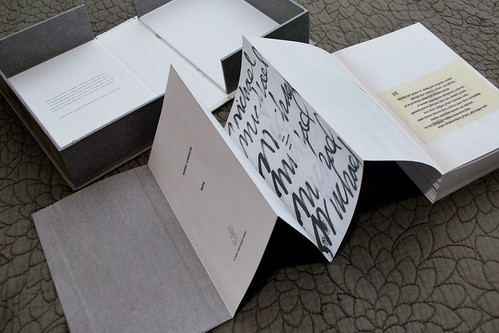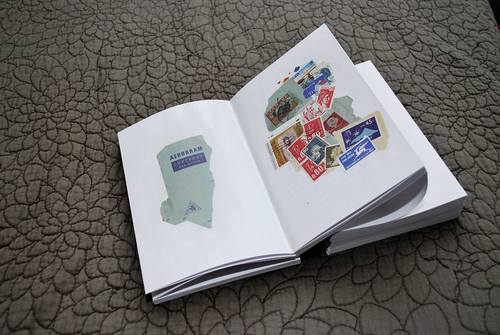(2010), the protagonist, Kevin Quinn, having been accidentally knocked down by a dog and realizing he has no interest in punishing the careless teen holding the leash, thinks:
A lifelong Midwesterner myself, that's a very familiar attitude. I think of it as the "Yes, but" response, and it's what I found myself thinking at some point on nearly every page of David Shields's simultaneously fascinating and maddening
.
, so I'll keep my summary short: in 618 brief entries, as short as a sentence or as long as a couple of pages, Shields makes a deliberately fragmented, elliptical argument against the practice of fiction and in favor of a hybrid form of nonfiction and memoir that he dubs the lyric essay. The book is deliberately provocative--Shields lifts many of his lines from other sources, arguing that he's "trying to regain a freedom that writers from Montaigne to Burroughs took for granted and that we have lost"--and deliberately slippery, constructed less as an argument and more as an Escher-like set of moving staircases that can be deployed in various combinations to lead the reader wherever Shields is heading at that moment.
The entries can be as silly and pointless as this:
187
These categories are plastic.
But they aren't.
Ah, but they are.
Or as banal as this:
234
The lives in memoirs often have clean lines, like touched-up photographs. They glow in the dark. Does the pursuit of dramatic effects enhance the truth or bend it?
And they can be as pithily thought-provoking as this:
321
Story seems to say that everything happens for a reason, and I want to say, No, it doesn't.
Throughout, Shields returns to the theme of his own boredom with fiction, his belief that it is a tired genre, and that its exhaustion leads it to stifle creativity:
57
In 1963, Marguerite Yourcenar said, "In our time, the novel devours all other forms; one is almost forced to use it as a medium of expression." No more. Increasingly, the novel goes hand in hand with a straitjacketing of the material's expressive potential. One gets so weary watching writers' sensations and thoughts get set into the concrete of fiction that perhaps it's best to avoid the form as a medium of expression.
He is particularly troubled by plot, as in this entry:
54
Plot is a way to stage and dramatize reality, but when the presentation is too obviously formulaic, as it so often is, the reality is perceived as false. Skeptical of the desperation of the modernist embrace of art as the only solution, and hyperaware of all artifices of genre and form, we nevertheless see new means of creating the real.
To which I find myself saying, "Yes, but . . . " Yes, I love
The Unquiet Grave, but I also love
The Rock Pool. I love
The Crack-Up, but that doesn't diminish my love of
The Great Gatsby. I love
Anna Karenina while still managing to love
Tristram Shandy. Their different approaches need not be reconciled to be appreciated. For someone who is attacking form, Shields far too often falls victim to the inherent peril of the manifesto form: the way it blinds its writer to the possibility that the fault might lie, not in their stars, but in themselves--that the problems may lie less with these genres than with Shields as a reader. If one finds novels tired and other forms more vibrant, that's fine, but it's a big leap from there to saying that
the novel is tired.
In some sense, I feel that Shields gives the game away in this entry:
133
I've always had a hard time writing fiction. It feels like driving a car in a clown suit. You're going somewhere, but you're in costume, and you're not really fooling anybody. You're the guy in costume, and everybody's supposed to forget that and go along with you.
Again, I think, "Yes, but." Yes, but
that's the agreement: when a reader opens a book, he implicitly agrees that, unless you draw attention to the clown suit through incompetence or direct reference, he won't take note of it, won't mind it--in fact, he'll even be glad for it, because
he's picked up a novel on purpose, looking for this sort of experience. Does that make it tired? It certainly
can, if the novel's no good, but by no means does it have to be. If Shields is unwilling to wear the clown suit, that's fine, but so long as readers are willing to take the ride, there's no reason to strike it from the list of options for other writers.
One of the reasons I opened this post with a quote from James Hynes's
Next was because
Reality Hunger kept coming to mind as I read it. I'm confident that Shields won't ever read
Next, and that if he did read it, he'd hate it. It's a straightforward, psychologically realistic novel; Hynes, in other words, is wearing the clown suit. And, because the book is constructed as a single day in the life of its protagonist, Kevin Quinn, during which he reflects back on important and unimportant moments of his life, there are a couple of moments when the reader has to simply choose to ignore the clown suit, for no matter how skilled an author is, with this many memories to call up, there can't help but be times when the transitions seem a bit forced. At those points, Shields surely would cry foul.
But even as
Next would likely confirm every one of Shields's prejudices about the novel, at the same time it serves as a rousing rebuttal to his manifesto. In entry 383, Shields writes,
It is my ambition to say in ten sentences what everyone else says in a whole book--what everyone else does not say in a whole book.
--and it is that very sentiment that
Next denies:
Next is not
about something. It's not a mere vehicle for transmitting a couple of pithy ideas. I suppose I could try to break it down to a sentence or two (though they'd require giving too much away--click
here if you want to see them), but that's pointless:
Next exists
to be a novel. It exists to give us a convincing--and, because it is successful, moving--illusion of access to another person's consciousness, to throw a line across the unbridgeable gap between self and other, to lend us understanding of a life not our own.
In other words, it's a novel. And a good one. It familiarizes us with two distinct locales, Ann Arbor and Austin, and shows us things we might not have taken the time to notice in our daily lives, like this scene at an Austin Starbucks:
The morning rush is nearly over, and the place is disheveled--napkins on the floor, crumbs underfoot, a plastic stirrer in a little pool of coffee on the countertop. Behind the counter a black girl with dreadlocks hangs on a lever at the espresso machine, and a golden-haired white girl with a stain on the breast of her company tunic slouches at the register. They each have that end-of-shift, thousand-yard stare that Kevin recognizes from his own days in retail. Meanwhile a rotund young woman with a buzz cut works up a sweat changing out the trash bins; she yanks a bulging bag of cups into the air and twists it sharply, as if snapping its neck.
It reminds about us of the vagaries of relationships, broken and unbroken:
He knew that look, and even now, when it shouldn't matter anymore what she thought of him, he hated it and feared it. It was the look she gave him when she was measuring him against some private standard in her head. It was a look that already held the expectation that he would disappoint her. The problem was that he never knew what the standard was, and she wouldn't tell him. It was a look that still made him angry--not the implied judgment itself, but that fact that he still let it get to him.
It is smart about the ways that attachment to the past can be limiting, but it is just as smart about the dangers of complacency and self-congratulation. It's perceptive about how and what we can pick up about others on quick acquaintance:
The way she's composed her face tells Kevin that apologies don't come easy to her, but that she has disciplined herself to make them when necessary. He is appropriately appeased that she's taking the trouble for him. . . . She has made up her mind to be nice, and nothing, evidently, will deter Dr. Barrientos after she's made up her mind. . . . Kevin wonders if Dr. Barrientos is able to do anything at all without you being able to see the wheels turning. That could be a kind of curse, especially if she's aware of it, leading to an infinite regression of self-consciousness.
And, as the phrasing of "infinite regression" gently hints, the book is funny, sardonically, wryly, self-deprecatingly funny, Kevin Quinn's middle-aged meanderings akin to, if less coruscating than, those of the hero of Sam Lipsyte's
The Ask. (Shields, meanwhile, gives the impression of being completely impervious to humor--the least funny writer this side of James Wood--unless, that is, the whole enterprise is an elaborate joke.) Kevin comes fully to life, and by the end of the book we
know him, know the mid-life dilemmas he faces, and worry about how he'll resolve them.
None of that can be boiled down to ten sentences and retain its value. None of the things that
Next does well matter much outside of their larger context, the agreement we make with Hynes to disregard the artifice long enough to be rewarded with a reminder of just how much we are capable of caring about people we'll never meet, and just how much, when giving in to a good writer, we can learn about how people live in the world.
Can a lyric essay do that? Of course it can--but that needn't require even its most strenuous partisan to dismiss the novel. As Husain Haddawy wrote in the introduction to his translation of the Thousand and One Nights, "There are other fair creatures in the world"; a Midwesterner knows better than to write them off.









